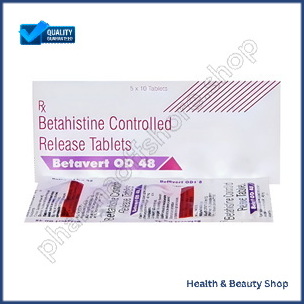ADDICTION
ALCOHOL DEPENDENCE
QUIT SMOKING
ALLERGY
ANTI FUNGAL
FUNGAL INFECTION
FUNGAL NAIL INFECTIONS
ANTI-REJECTION DRUGS
ANTI WORM
ANTIBIOTIC
BACTERIAL INFECTIONS
ARTHRITIS
GOUT
OSTEOARTHRITIS
RHEUMATOID ARTHRITIS
BLOOD
LOW PLATELET COUNT
THROMBOPHLEBITIS
VARICOSE VEINS
COLON
ANAL FISSURE
PILES
ULCERATIVE COLITIS
DIABETES CARE
DIABETES INSIPIDUS
DIABETES TYPE
DIABETIC FOOT ULCERS
GLUCOSE MONITOR
EYES/EAR CARE
DRY EYES
EYE CARE
EYE EXAMINATION
EYE INFECTION
EYE LASHES
EYE PAIN
GLAUCOMA
OCULAR HYPERTENSION
UVEITIS
FEVER CARE
MALARIA
RHEUMATIC FEVER
TYPHOID FEVER
GASTROINTESTINAL
ACIDITY
CONSTIPATION
CROHN'S DISEASE
DIARRHOEA
GALLBLADDER STONES
INTESTINAL ULCERS
IRRITABLE BOWEL SYNDROME
MOTION SICKNESS
NAUSEA
Betavert 48 mg (Betahistine)
| Active Ingredient (Generic Name): | Betahistine |
|---|---|
| Indication: | Vertigo, Meniere’s disease |
| Manufacturer: | Sun Pharmaceutical Industries Ltd |
| Packaging: | 10 tablets in one strip |
| Strength: | 48 mg |
From: $79.00
Have you ever experienced the discomfort of vertigo and wondered about potential treatment options like Betavert 48 mg (Betahistine)? This medication is commonly prescribed for conditions like Meniere’s disease but understanding its mechanism of action and proper usage is essential for its effectiveness. Considering the importance of dosage, precautions, and potential interactions, exploring the ins and outs of Betavert 48 mg could shed light on its role in managing vertigo.
Why is this medication prescribed?
Betavert 48 mg, also known as Betahistine, is prescribed primarily to alleviate symptoms of vertigo caused by Meniere’s disease. Meniere’s disease is a disorder of the inner ear that affects your balance and hearing. When you experience vertigo, you may feel like you or your surroundings are spinning or moving, leading to dizziness and a loss of balance. This medication works by improving blood flow in the inner ear, reducing the pressure and fluid buildup that can cause vertigo.
In addition to treating vertigo associated with Meniere’s disease, Betavert 48 mg may also be prescribed for other inner ear disorders that result in similar symptoms. It’s important to follow your healthcare provider’s instructions carefully when taking this medication. While Betavert 48 mg can help alleviate vertigo, it’s crucial to discuss any concerns or side effects with your doctor to achieve the best possible treatment outcomes.
How should this medicine be used?
To properly use this medication, follow the dosage instructions provided by your healthcare provider. Betavert 48 mg (Betahistine) is typically taken orally with food to reduce the risk of stomach upset.
The usual dosage for adults experiencing vertigo symptoms is 16 to 48 mg taken three times a day. Your healthcare provider may adjust the dose based on your condition and response to the treatment.
It’s essential to take Betavert 48 mg exactly as prescribed and not exceed the recommended dosage. Swallow the tablets whole with a glass of water; don’t crush, chew, or break them.
If you miss a dose, take it as soon as you remember, but if it’s almost time for the next dose, skip the missed dose and continue with your regular dosing schedule. Don’t double the dose to catch up.
Inform your healthcare provider if your condition worsens or doesn’t improve while taking Betavert 48 mg.
Other uses for this medicine
When considering other uses for this medicine, it’s important to consult with your healthcare provider for guidance on its potential applications.
While Betavert 48 mg (Betahistine) is primarily prescribed to treat vertigo and Meniere’s disease symptoms, some studies suggest potential off-label uses. Research indicates Betahistine may have a role in improving blood flow to the inner ear, which could benefit individuals with certain types of hearing loss.
Additionally, there’s ongoing investigation into Betahistine’s potential for addressing migraines and balance disorders unrelated to Meniere’s disease. However, the effectiveness and safety of Betahistine for these purposes require further scientific validation.
It’s essential to remember that using medications off-label should only be done under the supervision and recommendation of a qualified healthcare professional. They can assess your specific health condition, provide personalized advice, and monitor your response to the medication to ensure favorable outcomes.
What special precautions should I follow?
When taking Betavert 48 Mg (Betahistine), it’s crucial to check for any potential drug interactions.
Make sure to inform your healthcare provider about all medications, supplements, and herbal products you’re currently using.
This precaution can help prevent any adverse effects and promote the safe and effective use of Betavert 48 Mg.
Check for Drug Interactions
Before taking Betavert 48 Mg (Betahistine), it’s important to carefully check for potential drug interactions to guarantee your safety and well-being. Here are four essential steps to make sure you’re taking Betavert 48 Mg (Betahistine) safely:
-
Consult with Your Healthcare Provider: Always inform your doctor about any medications, supplements, or herbal products you’re currently taking to avoid potential interactions.
-
Read Medication Labels: Thoroughly read the labels of all medications to check for any warnings or precautions regarding drug interactions.
-
Research Online Resources: Utilize trustworthy online resources or consult with a pharmacist to gather information on possible interactions with Betavert 48 Mg (Betahistine).
-
Stay Alert to Symptoms: Be vigilant for any unusual symptoms or side effects when starting Betavert 48 Mg (Betahistine) in combination with other medications.
What special dietary instructions should I follow?
To maintain the effectiveness of Betavert 48 mg (Betahistine), it’s important to adhere to specific dietary instructions. While taking Betavert 48 mg, it’s recommended to avoid consuming alcohol as it may worsen dizziness or drowsiness. Additionally, limiting the intake of caffeine-containing beverages such as coffee, tea, and certain sodas can help reduce the risk of experiencing side effects like increased heart rate or nervousness.
Maintaining a consistent and balanced diet rich in fruits, vegetables, whole grains, and lean proteins can contribute to overall well-being and may enhance the efficiency of Betavert 48 mg. It’s advisable to avoid sudden dietary changes or extreme restrictions while taking this medication, as they may impact your body’s response to the drug.
Remember to stay hydrated by drinking an adequate amount of water throughout the day. Proper hydration is essential for the effective functioning of Betavert 48 mg and can help prevent potential side effects. If you have any specific dietary concerns or questions, consult your healthcare provider for personalized guidance.
What should I do if I forget a dose?
If you miss a dose of Betavert 48 mg (Betahistine), take it as soon as you remember. However, if it’s almost time for your next dose, skip the missed dose and continue with your regular dosing schedule. Don’t take a double dose to make up for the one you missed.
It’s crucial to maintain a consistent medication routine to guarantee the effectiveness of Betavert 48 mg in managing your condition. Missing a dose occasionally is common, but try to take your doses at the same time each day to help you remember. Consider setting a reminder on your phone or associating it with another daily routine to help you stay on track.
If you have trouble remembering to take your medication, speak to your healthcare provider for additional support or strategies. Consistency in taking Betavert 48 mg as prescribed can contribute to better symptom management and overall treatment outcomes.
What side effects can this medication cause?
When taking Betavert 48 Mg (Betahistine), it’s important to be mindful of potential side effects. Some side effects can be severe, so it’s vital to monitor for persistent symptoms.
If you experience any concerning symptoms, contact your doctor promptly.
Monitor for Persistent Symptoms
What side effects can Betavert 48 mg (Betahistine) cause that you should monitor for persistently?
-
Dizziness: You may experience dizziness, especially when changing positions.
-
Headache: Headaches can occur as a common side effect of Betavert 48 mg.
-
Digestive Issues: Keep an eye out for stomach upset, nausea, or vomiting.
-
Allergic Reactions: Watch for signs of allergic reactions like rash, itching, swelling, severe dizziness, or trouble breathing.
Remember to monitor your symptoms closely and report any concerns to your healthcare provider promptly. If you experience any severe or persistent side effects, seek medical attention immediately to safeguard your safety and well-being.
Some side effects can be serious. If you experience any of the following symptoms, call your doctor immediately:
Serious side effects from Betavert 48 mg (Betahistine) may require immediate medical attention. If you experience any of the following symptoms, call your doctor immediately:
-
Severe allergic reactions such as rash, itching, swelling of the face, tongue, or throat, difficulty breathing, or chest tightness.
-
Sudden chest pain, shortness of breath, or coughing up blood, which could indicate a serious heart condition.
-
Signs of a stroke like sudden numbness or weakness, especially on one side of the body, sudden confusion, trouble speaking, or severe headache.
-
Unexpected vision changes, loss of coordination, or difficulty walking, as these could be signs of a neurological issue.
What should I know about the storage and disposal of this medication?
To store and dispose of Betavert 48 mg (Betahistine) properly, follow these guidelines for safe use. Store Betavert 48 mg at room temperature away from light and moisture. Keep it out of reach of children and pets. Avoid storing it in the bathroom.
Check the expiration date before use and discard any expired medication. Don’t flush Betavert 48 mg down the toilet or pour it into a drain unless instructed to do so. Properly dispose of this medication by following local regulations for medication disposal.
You can consult your pharmacist or local waste disposal company for more information on how to safely dispose of Betavert 48 mg. If you have any unused or expired Betavert 48 mg tablets, return them to your pharmacist for proper disposal.
In case of an emergency/overdose
In case of an emergency or overdose with Betavert 48 mg (Betahistine), immediately seek medical assistance or contact poison control. If you suspect an overdose, it’s important to act promptly. Symptoms of an overdose may include severe dizziness, nausea, vomiting, and difficulty breathing. Don’t wait for symptoms to worsen before seeking help.
When you reach out for medical assistance, be prepared to provide important information such as the amount of medication ingested, the time of ingestion, and any symptoms being experienced. This data will aid healthcare professionals in determining the best course of action.
It is crucial not to attempt any home remedies or treatments for the overdose without professional guidance. Emergency medical personnel are trained to handle such situations effectively and will provide the necessary care to manage the overdose safely.
What other information should I know?
If you’re taking Betavert 48 mg (Betahistine), it’s important to be aware of certain additional information. Above all, it’s essential to inform your healthcare provider about any other medications, vitamins, or supplements you’re currently taking, as they may interact with Betahistine. Additionally, it’s recommended to avoid alcohol while on Betavert 48 mg, as it may increase the side effects of dizziness or drowsiness.
Moreover, if you have any existing medical conditions such as asthma, peptic ulcer, or pheochromocytoma, it’s important to discuss with your doctor before starting Betahistine. This medication may not be suitable for individuals with certain health conditions.
Furthermore, it’s essential to follow the dosage instructions provided by your healthcare provider strictly. Don’t increase or decrease the dose without consulting your doctor. If you experience any severe side effects or allergic reactions while taking Betavert 48 mg, seek medical help immediately.
Brand names
Under various brand names, Betavert 48 mg (Betahistine) is available in the market for the treatment of certain conditions. Betahistine, the active ingredient in Betavert 48 mg, is sold under different brand names worldwide. Below is a table showing some of the brand names under which Betahistine is marketed:
| Brand Name | Manufacturer |
|---|---|
| Betavert | Sun Pharmaceutical |
| B?tahistine | Teva Pharmaceuticals |
| Serc | Abbott Laboratories |
| Betaserc | Abbott Laboratories |
| Betahistine Dihydrochloride | Various Generic Manufacturers |
These brands may vary in availability depending on your location. It is crucial to consult your healthcare provider or pharmacist to make sure you are using the correct brand and dosage prescribed for your specific condition. While the active ingredient is the same across these brands, differences in formulations and inactive ingredients can impact effectiveness and tolerability.
Purchase Locations
When looking to purchase Betavert 48 mg (Betahistine) or its alternative brand names, consider checking with local pharmacies or online retailers for availability. Local pharmacies are a convenient option for obtaining Betavert 48 mg quickly. Pharmacists can provide information on availability, pricing, and potential discounts or insurance coverage. They may also offer guidance on how to take the medication and any potential side effects to watch out for.
Online retailers, such as reputable pharmacy websites, may also carry Betavert 48 mg for purchase. When buying online, make sure that the retailer is licensed and sells genuine medications to avoid counterfeit products. Check for customer reviews and ratings to gauge the retailer’s reliability. Some online retailers may offer home delivery services, making it convenient to receive your medication without leaving your house.
Compare prices between different purchase locations to find the best deal while ensuring the product’s quality and authenticity.
To summarise
Consider comparing prices and verifying authenticity when purchasing Betavert 48 mg (Betahistine) from different locations. Prices may vary between pharmacies or online retailers, so it’s wise to shop around for the best deal. However, be cautious of notably lower prices, as they could indicate counterfeit products or compromised quality. Prioritize purchasing Betavert 48 mg from reputable sources to guarantee you receive a genuine and effective medication.
When comparing prices, take into account any additional costs such as shipping fees or taxes that may impact the total amount you pay. Verify the legitimacy of the seller by checking for licensing information and reviews from other customers. Authentic Betavert 48 mg tablets should come in proper packaging with the manufacturer’s information clearly displayed.
Based on 0 reviews
Only logged in customers who have purchased this product may leave a review.







There are no reviews yet.